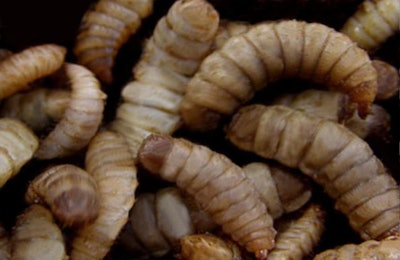
First published October 1, 2021
With alternative proteins increasing in popularity in human foods, they are also gaining interest from consumers of pet food, and black soldier fly (BSF)-based ingredients are among the most popular.
“We know that whatever food trend happens in the human food market is bound to roll into the pet food,” said Trevor Faber, director of companion animal nutrition and technical service at Trouw Nutrition, who spoke at Petfood Forum 2021 in Kansas City. And, he added, “alternative proteins are THE food trend.”
Part of the reason for growing interest in BSF protein and oil is because, on the regulatory front, “any hurdles that had been in place are beginning to be removed,” said Brad Ewankiw, product line manager, feed, at Enterra, a producer of BSF products.
The Association of American Feed Control Officials (AAFCO) approved BSF protein for adult dog food and treats in August, and AAFCO approvals are expected in 2022 for BSF oil for adult dog food and treats, as well as BSF protein and oil for adult cat food and treats. BSF use in dog and cat food has already been approved by the European Food Safety Authority.
“We really see BSF as a great alternative as a novel protein in hypoallergenic foods,” Ewankiw said. “So, food brands that are looking to provide alternatives for dogs that do have some food allergies, skin and coat concerns, etc., it can be utilized as another alternative there and has shown some really good results.”
He added that BSF ingredients have antimicrobial and prebiotic qualities, so they have added nutritional benefits for pets.
“Because of the lauric acid and the fat showing antimicrobial benefits, as well as the chitin that’s coming out of the exoskeleton of the grub showing prebiotic and antimicrobial benefits, we are very excited about the opportunities within pet food,” he said.
Ewankiw’s colleague, Laura Metcalf, key account manager, animal nutrition at Enterra, explained some of the feeding trials the companies have done on dogs that show good palatability, high total digestibility, very high protein digestibility and no concerns for dog safety or health.
“In trials with dogs, the BSF diet performed well and provided all of the necessary nutrients to maintain dog health,” Metcalf said, adding that the BSF protein can be easily incorporated into diets for adult dogs, often as a direct swap for other proteins.
Total digestibility for premium pet food ranges from 84% to 90%, she said, with the BSF digestibility trial showing 84.6% mean total digestibility. Mean protein digestibility was even higher, at 85.4%, which is higher than some competing novel proteins.
The palatability trial found that dogs’ first approach when comparing a BSF diet and a plant protein-based diet was similar, but first taste for the BSF diet was 62% compared with 38% of the plant protein diet.
“There’s something about it, whether it be the smell or the appearance, that attracted the dogs more,” Metcalf said.
And when it comes to consumers’ willingness to feed insect proteins to their pets, another Enterra study found that, after a very brief introduction to the ingredients, 31% of consumers said they would purchase an insect-based protein pet food product.

















